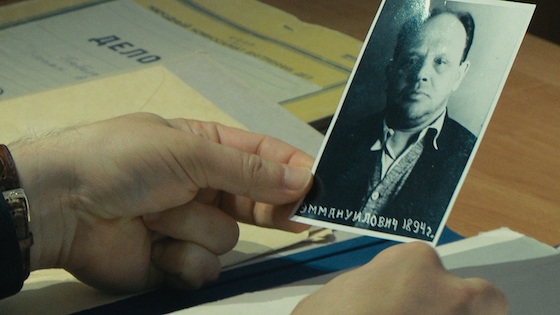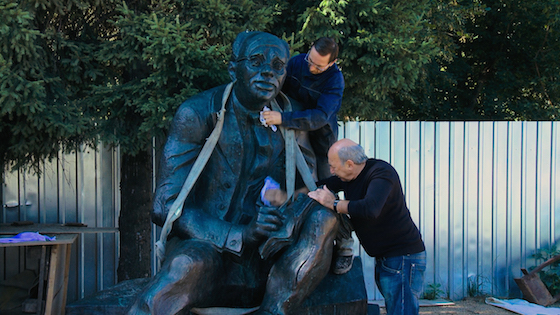[Rating: Swiss Fist]
At a time when Russia is once again rattling its international sabre, and clamping down on civil liberties, a documentary exploring one Soviet writer’s persecution at the hands of Stalin and the U.S.S.R.’s secret police feels all-too timely. Finding Babel is an exploration of Isaac Babel, the Soviet journalist, playwright, and short story author who went from celebrated artist to enemy of the state in a heartbeat. The documentary uses narrated excerpts from Babel’s writings, talking-head interviews, and impromptu conversations with ordinary eastern European and Russian citizens to try and get to the heart of who the writer was, and what his words have inspired. Yet despite the fact that history provides several parallels between Babel’s time and our own, the documentary never establishes why its particular exploration matters to anyone outside of Babel’s family.
Structurally, Finding Babel is straightforward, yet not without pleasant flourishes. Director David Novack follows the grandson of Isaac Babel, Andrei Malaev-Babel, as the latter gentleman goes on a tour of his famous ancestor’s homeland, as well as several villages and cities featured prominently in the writer’s work. Andrei speaks directly to the camera or in voice-over frequently throughout the film, and explains that he was always a bit bookish growing up, and that his famous grandfather has always been a source of inspiration. A theater teacher and director, Andrei is compelled to look into the details surrounding his grandfather’s life and death after a lifetime of fascination, and tries to get a better sense of Babel as both a writer and a man.
Gorgeous animation sequences frame the segments when Finding Babel turns the wheel over to the famous Soviet writer, whose words come to the viewer like poetry wrapped in velvet. This luscious prose as read by Liev Schreiber is juxtaposed against the cruel, brutal reality of the world it portrays, as Babel’s writing never shied away from the grotesque abuses perpetrated by the Soviet state following the communist revolution. The work stands as both a celebration and an indictment of the Soviet government under Stalin’s rule, a seeming contradiction that makes the work and Babel’s story all the more intriguing.
Babel’s ‘Red Cavalry’ and ‘Odessa Tales’ are a fascinating peek into a Soviet state littered with optimism and contradiction: civility and brutality. Like Hemingway, Babel had the unique ability to draw out the humanity in inherently vicious situations, and Novack’s documentary invests a considerable amount of time educating its audience in this regard. Andrei travels to the areas portrayed in these pieces of pseudo-fiction to connect with the work on a more visceral level, and seems to develop a deeper appreciation for his grandfather’s writings as a result.
And while Andrei’s journey deepens a grandson’s connection to his family’s history and place within the larger 20th century Russian narrative, its importance and relevance outside the family and in a modern context never really materializes. Sure, Babel’s ability to combine the brutal realities of his world with a poetic and visceral tone is admirable, yet the documentary never really establishes why this is important. Isaac Babel was celebrated for his work for a time, yet, as the documentary explains, once Stalin had no more use for the subversive writer, Babel found himself in prison, and soon thereafter, dead. Sadly, Babel was but one of literally millions of Soviet citizens murdered during Stalin’s “Great Purge” of the late 1930s, which leads one to wonder what made this particular man so special.
As Andrei travels throughout Paris, Russia, and Ukraine, he seems genuinely moved by the remnants of his grandfather’s world, and develops a deeper connection to the famous writer’s work, yet again, why all of this is important outside the familial context remains elusive. To non-European audiences unfamiliar with Babel’s work, this journey seems interesting, to be sure, yet it lacks a modern framework that would ground it in something relevant to the average layperson. As mentioned earlier, the 21st century has seen Russia’s aggressive action in Ukraine and the Crimea reshape the geopolitical landscape, a development that practically screams for an exploration of how Babel’s world mirrors this one nearly eighty years after his murder.
Yet Finding Babel seems more interested in celebrating Isaac Babel than connecting the man’s writing to something larger at play in 2016. Ironically, doing this would have bolstered the case Novack seems to be trying to make, since it would have contextualized Babel’s struggle into a relatable topic that might be better understood through this unique lens. How was Stalin’s purge of intellectuals and artists similar (or dissimilar) to what is going on in Russia today (i.e., anti-LGBT laws, Pussy Riot’s imprisonment, etc.)? What can the audience learn about the trajectory of totalitarian regimes via a contextualization of Babel’s sudden rise and fall within the Soviet Union’s sociopolitical apparatus?
Maybe most importantly: was Babel a fool for staying in a country that had gone from celebrating subversive art to persecuting it in what amounted to a few hectic months? A lack of critical analysis in Finding Babel leaves the audience with a rah-rah exploration of a celebrated writer, which amounts to a book report documentary that gives people a lot of reasons to like Babel, but few opportunities to dive deeper into what the guy’s life and work meant.
What did Babel’s life and death teach the world, and how was his writing a reflection of that lesson, if at all? Much like another “Finding” movie playing at this year’s 2016 Seattle International Film Festival, although this documentary is called Finding Babel, the audience comes away from this one empty-handed: the elusive truth behind Isaac Babel anything but “found.”








Comments on this entry are closed.